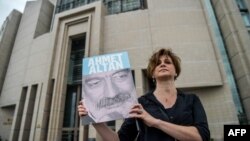In a packed Istanbul courthouse the trial of 17 journalists, accused of being involved in July’s failed coup, got underway Monday. All are facing long sentences, including life if convicted.
Prosecutors allege the journalists belong to a network of followers of the U.S.-based Turkish Islamic cleric Fethullah Gulen, who Turkey's government blames for the coup attempt.
Nazli Ilicak is a leading newspaper columnist who rejected the accusations, telling the court she was a supporter of President Recep Tayyip Erdogan before he came to power and spent her life opposing coups, pointing out her father was a senior minister who had been jailed following a 1960 military takeover.
The 74-year-old Ilicak, along with Mehmet and Ahmet Altan, are among the most high-profile writers and journalists facing prosecution. All have been held for months in pre-trial detention.
The first three hours of Monday’s hearing was taken up reading the more than 200-page indictment. Much of the cited evidence made no reference to the journalists activities, but focused on the cleric Gulen. Prosecutors claimed holding accounts in an alleged Gulen bank and possession of $1 bills was evidence of being part of the cleric’s secret network and involvement in the coup.
International criticism
Even before the case started the quality of the evidence drew withering international condemnation.
“This trial marks a new level in the growing absurdity of the charges being brought against journalists,” wrote the Paris-based Reporters without Borders, an organization that defends media freedom.
Many international and national human rights groups attended Monday’s hearings.
"It's very concerning people are really facing serious charges, with potentially three life sentences on the basis of very, very little evidence of criminal acts, and that's really worrying,” warned Amnesty International’s Milena Buyum, speaking after attending the first day of hearings,
“You have pages of pages of references of articles written by Ahmet Altan, comments he, and his brother [Mehmet] and Nazli ilicak made on a TV program on the day before the military coup. They were making political commentary entirely protected under the right of freedom of expression,” added Buyum.
Human rights groups accuse Turkey of being the world's worst jailer of journalists, with more than 170 incarcerated since the post-coup crackdown. Monday’s hearing is likely to only add to questions over the legitimacy of that crackdown.
“A very legitimate task of trying to bring coup plotters to justice has been completely lost in a mass purge of those the government does not like” claims Emma Sinclair Webb, Turkey researcher of the U.S.-based Human Right’s Watch.
”It has become a lawless indiscriminate prosecution, just going after anyone who in this frenzied crackdown the government thinks is good to get off the scene, to get rid of,” Webb said.
Truth is the victim
But before the trial Erdogan dismissed such criticism.
"Whenever we go abroad, Western media outlets come up with the same argument, claiming there are many detained journalists in Turkey. However, according to figures from our Ministry, only two people out of 177 who identify themselves as journalists are holders of a press card. In addition, one of these persons is currently in jail for murder and the others for their involvement in terrorist organizations," Erdogan said in a speech Saturday to national media heads.
The president went on to warn there would be no let up in the crackdown.
“I see no difference between those who sell their news headlines with the instructions of a terrorist organization and those who take to the mountains with a gun in their hands,” said Erdogan.
Last month, Erdogan warned there would be no ending of the current state of emergency introduced after the coup, citing ongoing terrorist threats and the need to restore economic prosperity.
The Turkish presidents’ comments on the media drew a swift rebuke.
“We got used to such statements [by Erdogan]. Let everyone say whatever they want. The jailed journalists are inside because of their journalistic activities, because they chase the news, because they chase the truth,” Pinar Turenc, the head of Turkish Press Council, said.
But with some of the country’s prominent writers and journalists facing decades in jail, human rights groups warn many reporters may well now think twice about chasing the truth.
“This trial [Monday] along with others has a chilling effect” warns Amnesty International’s Buyum, “It sends a message to the rest of society, to other journalists expressing your opinion, being critical of power can end you up in this situation.”




